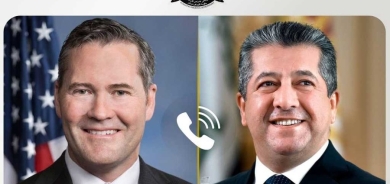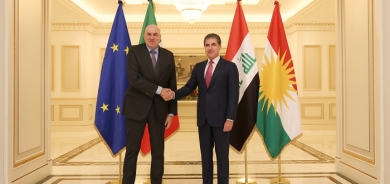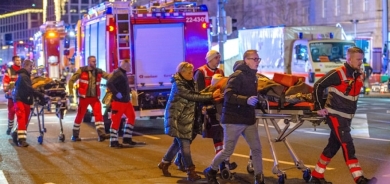Nazar Janabi to Gulan Magazine: “Any party not willing to work within the constitution should be held accountable”
October 26, 2011
Exclusive Interviews

While Mr. Janabi works now as a Researcher in Washington Institute for Near East Policy, he was one of the Iraqi Army’s officers from the southern and the central Provinces of Iraq who left the army and immigrated to asylum after the uprising in 1991. He returned back to home after the downfall of the Iraqi ex-regime. During 2004 – 2006, he occupied a position as General Manager of Defense Policies and Military Supplies in the Iraqi Ministry of Defense. Regarding to the research field; the field that Mr. Janabi works now in Washington Institute, Mr. Janabi is a specialist on Iraq and Middle East’s Security Affairs and The Democratization Process in the Region. Therefore; and regarding to the security and the stability situations in Iraq, along with the U.S withdrawal question from Iraq, we have contacted Mr. Janabi and he responded to Gulan Magazine as the following:* Nowadays; all the talks in Iraq are about the U.S Troop Withdrawal. Apparently; the United States intends to withdraw its troops in time. The question is; in your view, how far do you think that the Troop withdrawal endangers the security and the stability of Iraq?
It is absolutely necessary for a US contingent to remain in Iraq to support/ train / mentor Iraqi security forces-ISF- , not only because ISF lacks essential capabilities to protect the country but also to train Iraqi soldiers on the use of hi-tech equipment that Iraq has purchased or in the process of purchasing from the US – a good example is the F-16’s, Abrams tanks, Navy patrol boats…..etc. however, the fact that most politicians ran on a far right nationalistic platform and they still to-date frame their message to the public about Sovereignty – Al-Siyadah- had forced them into a deadlock position that requires an immense amount of political courage that I sincerely doubt exists. The end result is a willingness to take a major gamble with country’s future rather than admitting the lack of capability within ISF, even though the Chief of the Joint Staff stepped up and was willing to take the blame when he publically announced the ISF won’t be able to take full responsibility for the country’s security till 2020.
* In the current situation, when all the Iraqi Political Partners are making political bets on each others regarding to the US Withdrawal, meanwhile and on the real ground the Iraqi Political Process is paralyzed, they are even unable to complete the governmental cabinet formation. What is your comment regarding to this topic?
To run a proper democracy, the concept of separation of powers is of the utmost importance, unfortunately we’re still trying to fathom that concept and the tendency to try to dominate the three pillars of statehood is obvious. With these tendencies our country will struggle with the lack of services and security and will remain a weak economy and keep falling behind the modern world. Our leadership should understand that ruling the country with a pre-defined ideology just for the sake of fulfilling an ideological agenda will not take us anywhere and eventually the public will vote-out the ideology for the sake of progressives. So until there is a realization either by the political leadership or the public, whichever comes first, the situation in Iraq will remain unstable.
* But the distrust that exists today among the Iraqi Political Components has reached a dead-end and there are fears that the current Iraqi Prime Ministers might drive Iraq towards autocracy. In your view; do believe that these concerns are legitimate?
It seems that there is a lot of concern about Mr. Maliki’s tendencies from all factions of the political spectrum – except the state of law alliance of course-, that concern is – in my opinion- is legitimate and needs to be addressed by the PM to assure his political partners of his willingness to be law obedient and safeguard the constitution that the whole political process and Iraq’s future rest on. Other than that, his actions will build a big enough majority in the parliament to vote him out of office.
* There are suspended issues between the Kurds and the Federal government in Baghdad, but the most important one is the disputed territories issue. This is while observers think that these problems are going to be more complicated. So; in your opinion, in case the issues witnessed more complications, how far do you think that there will be risks of civil war to occur in Iraq again?
That is one of the key concerns of many political analysts and Iraq observers, it’s a real and imminent threat that needs to handled with wisdom and resolved within the parameters of the constitution that is the law of the land in Iraq, any party not willing to work within the constitution should be held accountable. Moreover, there was talk about the need for constitutional amendments to address some ambiguity in certain constitutional articles. To address that, the party who thinks there is a need for a constitutional amendment has every right to propose these amendments and if they pass through a referendum so be it but in the mean time everyone have to work within the current constitution not with what they want it to be.
* How far do you think that this critical situation of Iraq may grant chances for regional interference to increase in Iraq, or as it happens now; when the neighboring countries are violating Iraq’s Sovereignty?
That is another example of the vulnerability of Iraq; I don’t think the US presence will help to resolve this issue since these aggressions have been happening with the presence of Americans and will continue after they leave. The only way to stop these aggressions is to build an indigenous Iraqi deterrence capability that will have the aggressors think twice before striking Iraqi villagers. In the mean time, the Iraqi government can use economic means to try to influence the strategic balance since Iraq’s Turkey and Iran are Iraq’s biggest trading partners. That could include tariffs on goods and services imported from these two countries and many other measures that the public can be a part of such as boycotting goods made or imported from there, escalating the issue into the international public opinion court through social media campaigning and international organization involvement.
* Many observers are expecting that Iraq will witness instability again, and they believe that Iraq will face another civil and sectarian war. How far do you think that these risks might endanger the unity of Iraq?
This will depend on many social, geopolitical and economic factors. As things stand now. A complete collapse is unlikely; however, if Iraq remains on the current path of social injustice and poor governance with the public having no discourse the odds of it happening with increase dramatically.















